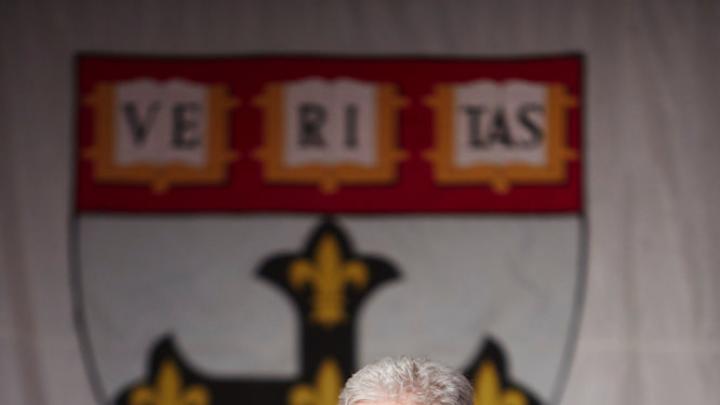Opening the Commencement ceremony at the Harvard Chan School of Public Health (HSPH), Dean Michelle Williams recognized a graduating student, Mohammad Al Safadi, who could not attend. “The programs he oversaw served refugees, earthquake victims, and others in desperate need of care,” she said. “Ordinarily, Dr. Al Safadi would be seated among this year’s graduating class…but issues related to his visa barred him from returning to the United States from a Wintersession trip taken to Jordan…He had hoped to return for Commencement, but we recently learned that his visa application was again rejected. These are challenging times—I don’t need to tell you all that. So many things we hold dear are now under threat.” Williams linked Al Safadi’s story with the history and philosophy of public health, a field that linked the categories of health and science with human rights, “fields that until then had little to do with each other.” The ceremony’s student speaker, William Seligman, teased out the same themes: public health is so elusive to define, he said, because it isn’t really a discipline but an aspiration, a field that exists to fulfill a moral mandate.
Keynote speaker Gina McCarthy, former administrator of the Environmental Protection Agency (EPA), began differently: “Thank you, Dean Williams, I really appreciate that you’ve invited me here today. But more importantly, I want to thank you for giving me a job.” McCarthy was named a fellow at the school almost immediately after being succeeded as the EPA’s head by President Trump’s nominee, Scott Pruitt. The new administration has promised to roll back Barack Obama’s climate change initiative, a centerpiece of McCarthy’s tenure at the agency. Her address at HSPH this afternoon was a deliberate response to the climate change-denying administration that succeeds her, and a call for graduates to consider it a duty not just to commit themselves to honest science, but also to communicate effectively with the public.
“It’s been clear to me as I’ve worked at every level of government that people everywhere are just desperately looking for trusted, independent advisers who can help them understand the world they live in, the risks they may be facing,” McCarthy said. “In many ways, government is no longer viewed by many as that trusted independent adviser...But people still value and increasingly depend on experts like you--scientists who are mission-driven, not special-interest-driven.”
Describing how scientific language is used to sow public uncertainty about the scientific consensus on climate change (a subject also written about extensively by history of science professor Naomi Oreskes), McCarthy continued: “When climate scientists have said, ‘climate warming trends over the past century are extremely likely due to human activities’…climate deniers use this precise language to make the case that scientists really aren’t sure—it’s just some kind of a crapshoot. And then when scientists make the…point that follows, that science is constantly evolving,” it gives climate deniers an opportunity to argue that the science remains unsettled. “Climate science is complicated…but despite that fact, we can say with absolute clarity that climate change demands immediate action to avoid what is essentially the most significant existential challenge of our time. We can’t sit quietly and let the language of science…be misinterpreted in ways that misrepresent the facts.”
When scientists do speak to the public (so-called real people), she continued:
I think you will be really excited to know that facts actually do matter to people. That people can and want to learn. That by and large people will make good decisions if you arm them with good, solid facts. And [when] people speak with very clear conviction in this country, policymakers and politicians—albeit many of them reluctantly—they will listen.
John Kerry, in his Commencement address yesterday at the Harvard Kennedy School, touched on similar themes. On the new administration, McCarthy had this to say: “Critics on Capitol Hill, who have filed bills to stop [the] EPA from considering the very best science, and to change the peer-review process so that industry can have a deciding voice—they are playing a very dangerous game…Efforts to protect the environment have up until recent years been bipartisan...At times like these, when public officials consider bills that undermine the science, budgets that eliminate critical investments, throw snowballs on the Senate floor to disprove global warming (that was a good one)…it has to be a stark reminder of our obligation to clearly and persistently convey what science tells us.”








